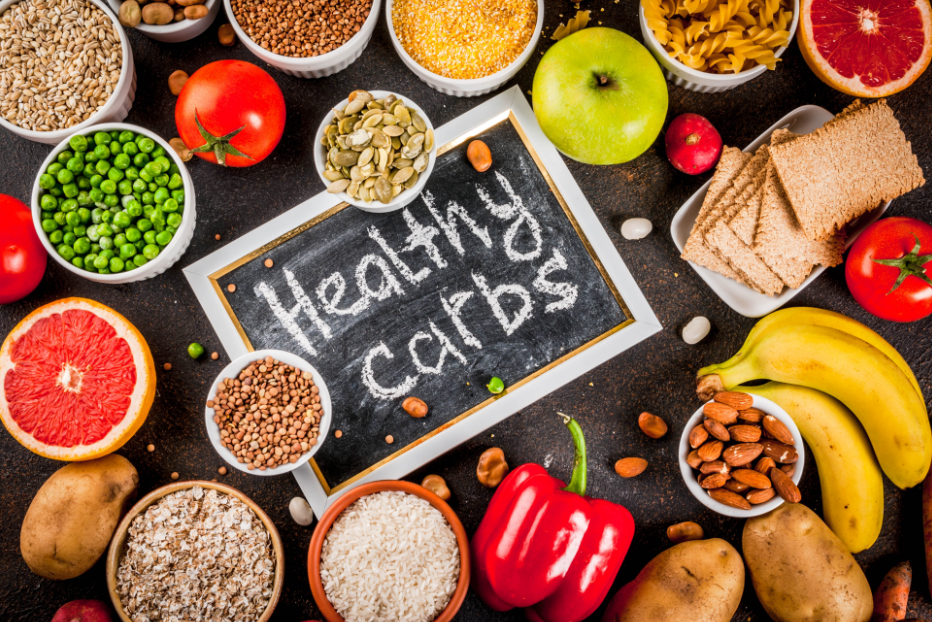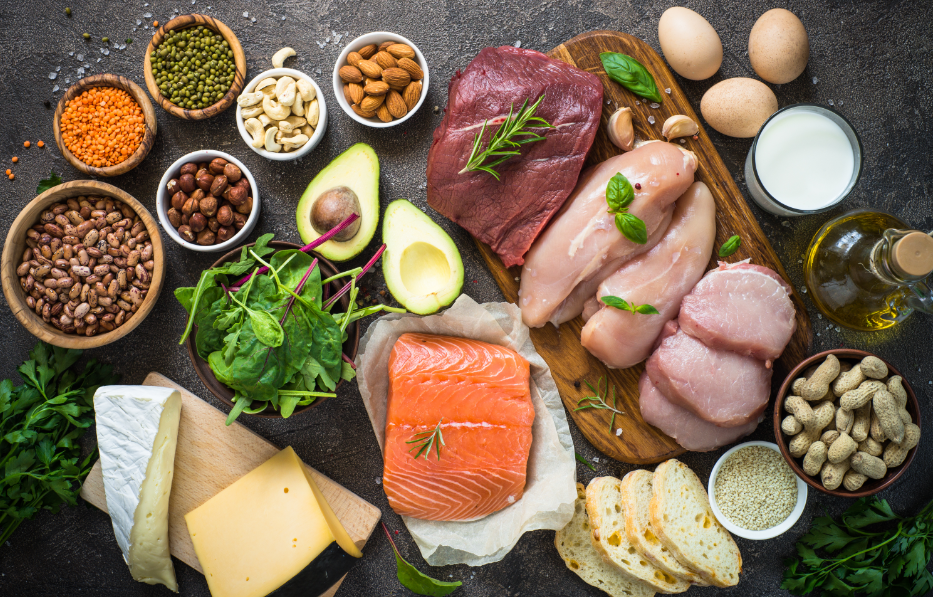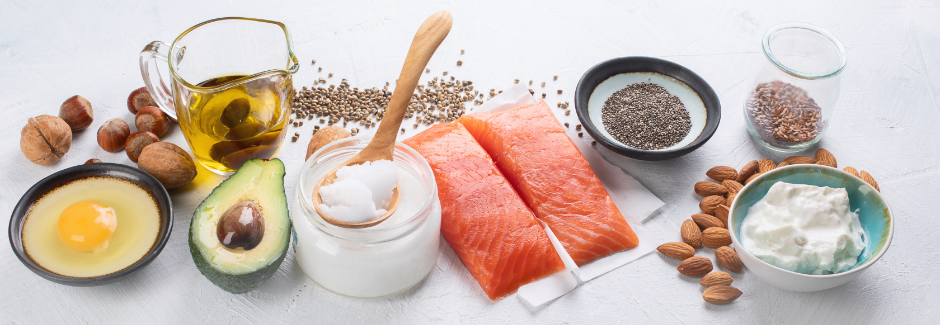I’ve found that what you eat profoundly impacts your day-to-day energy levels. Consuming energy-dense foods is not just about satisfying hunger; it’s about fueling your body in a way that supports sustained vitality and well-being.
The energy you need to tackle daily activities comes from the calories in foods. However, not all calories are created equal. The key is to focus on those that not only offer energy but do so in a beneficial manner over time.
Understanding the balance of macronutrients – carbohydrates, proteins, and fats – is essential for optimal energy. Each plays a distinct role in how your body generates and utilizes energy, and I’ll guide you in choosing the right mix to keep you powered throughout the day.

The Power of Complex Carbohydrates
When I talk about the types of carbohydrates to consume, picture complex carbohydrates as your body’s reliable fuel source – akin to a sustained-burning log on a fire. Complex carbohydrates are comprised of sugar molecules strung together like a necklace, which the body breaks down into glucose for steady energy use. This is in contrast to simple carbohydrates, which, although quick-burning like paper in a flame, can lead to rapid spikes in energy followed by crashes.
For a stable energy supply throughout your day, incorporating complex carbohydrates is essential. They digest more slowly than their simple counterparts, allowing for a more even release of glucose into your bloodstream. This translates to consistent energy levels without the disruptive peaks and troughs.
Some standout complex carbohydrates that can power your day include oats, quinoa, brown rice, and sweet potatoes. Whole grains, in particular, are excellent for providing fiber which not only contributes to prolonged energy but also aids digestion and heart health.
But why stop there? You can integrate these carbohydrate powerhouses in your meals by starting your day with a bowl of oatmeal or swapping white rice for quinoa in your lunch salad. Through these choices, your energy levels can avoid the dramatic highs and lows, keeping your focus sharp and your body humming along.

Lean Proteins: Building Blocks for Energy
I understand that it’s not just about eating anything you can get your hands on for energy; it’s about choosing the right kinds of foods. Protein is one of those pivotal choices. It’s crucial not only for building and repairing muscles but also for producing enzymes and hormones that help your body generate and use energy effectively.
Now, proteins come from a variety of sources. Animal products are the most recognized providers of protein, with options like chicken, turkey, eggs, and dairy standing out for their high-quality protein content. These proteins contain all the essential amino acids your body needs to function at its best.
But let’s not overlook the plant-based powerhouses. Foods like beans, lentils, chickpeas, tofu, and quinoa pack a protein punch while also bringing additional nutrients to the table, such as fiber and minerals. Including plant-based proteins in your diet not only contributes to a well-rounded approach to eating for energy but also offers a sustainable option for your health and the environment.
Opting for easily digestible proteins ensures that your body isn’t using up too much energy just to break them down. Think about including foods like Greek yogurt or a smoothie with protein powder as part of your meal plan, especially after workout sessions; they provide quick, accessible protein that can help you bounce back fast.
Transitioning seamlessly to the topic of healthy fats, it’s important to recognize that fats are not only a source of energy but also necessary for absorbing vitamins and providing essential fatty acids that our bodies can’t make on their own. Let’s now turn our attention to the role of healthy fats in keeping our energy tanks full.

Healthy Fats: Long-Lasting Energy Reserves
I know it’s easy to associate the word ‘fat’ with unwanted weight-gain, but let’s reset that thought right now. Your body actually thrives on certain fats, especially for energy. They are the marathon runners of fuel, offering your body a reservoir it can tap into over long periods. This is precisely why understanding fats – the good and the bad – is vital for managing your energy levels.
First up, unhealthy fats like trans fats and excessive saturated fats can be detrimental to your health, clogging arteries and causing a host of health issues. However, unsaturated fats – the mono and polyunsaturated kinds – play a crucial role in our well-being. They support heart health, aid in the absorption of vitamins, and yes, provide a reliable source of energy.
For an energy boost, focus on incorporating foods like avocados, nuts, seeds, and oily fish such as salmon into your diet. These not only supply steady energy but also keep you feeling full, which can prevent overeating. Olive oil and flaxseeds are excellent options besides. They’re not just energy enhancers; they also bring a bouquet of health benefits to the table.
As you ponder the role of fats in energy sustenance, remember that balance is key. Including healthy fats in every meal ensures that your body gets the long-term fuel it needs to stay charged. Combine these fats with proteins and complex carbohydrates, and you create a trifecta of nutrient power that keeps you running efficiently.

Putting It All Together: Meal Planning for Energy
I hope this guide has empowered you with a clear understanding of how to eat for energy. The idea is straightforward: combine complex carbohydrates, lean proteins, and healthy fats in your meals, and do not underestimate the role of hydration and micronutrients.
Meal planning is a tool to help you integrate these components into your daily life. Start with drafting a weekly menu that includes a variety of energy-sustaining foods. Remember, consistency is key to reaping the benefits.
Include snacks like nuts, yogurt, or fruit, for instance, to maintain energy levels throughout the day. And, if you lead a busy lifestyle, consider preparing meals ahead of time to ensure you always have nutritious options at hand.
Tailor these eating habits to fit your unique life circumstances. Whether you’re an athlete, a busy parent, a student, or a professional, the right balance of foods can help maximize your daily energy and improve overall well-being.
Make adjustments as needed, listen to your body, and consult with a healthcare professional if you have specific dietary needs. Your journey to a more energetic and vibrant life through food is well within reach. START TODAY and feel the difference in your energy levels, your ability to concentrate, and your overall quality of life.
